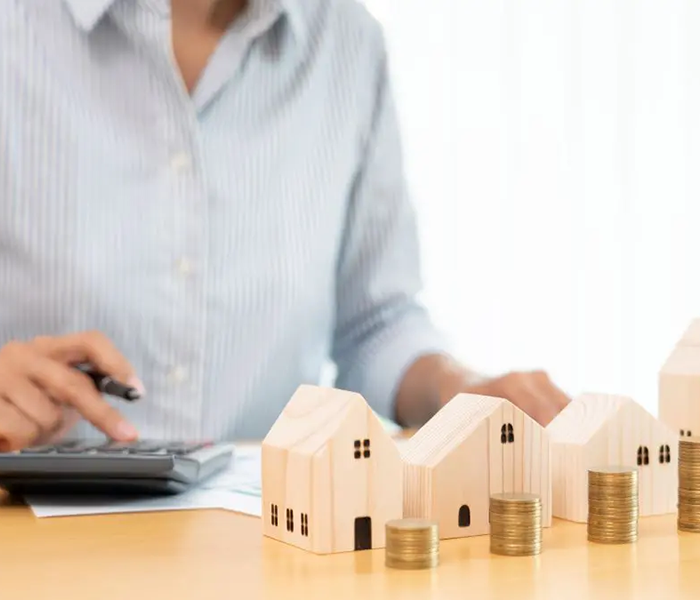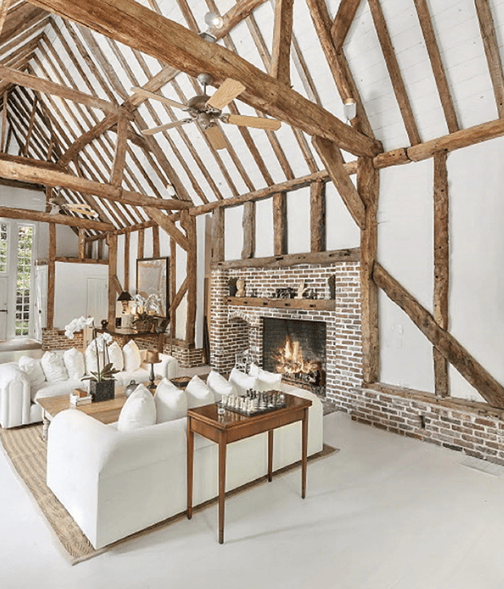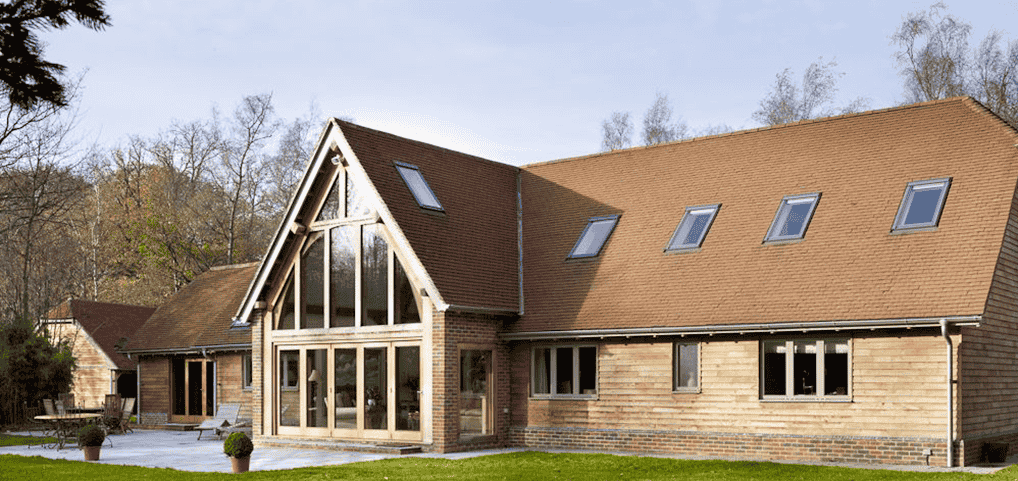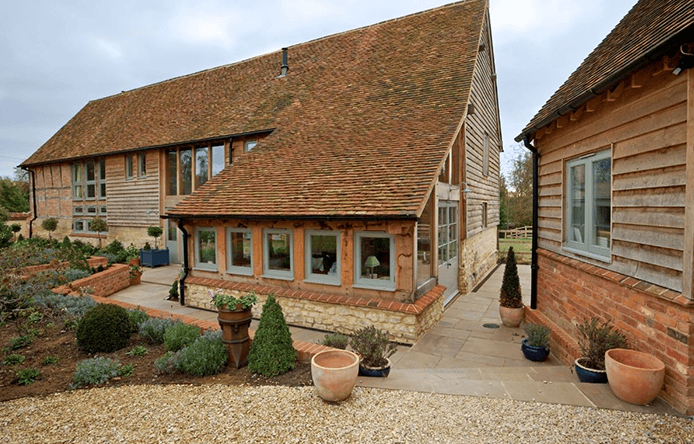With their high vaulted ceilings, open plan interiors, the promise of lots of space and idyllic country settings, it's easy to see why barn conversions are becoming increasingly popular. If you’re considering buying your own rundown barn and converting it into the home of your dreams, how can you go about raising the finance you need?
Getting a mortgage for a barn conversion may be more complex than if you were looking to finance the purchase of a standard property, but it's certainly possible and there are many options available. Several specialist property mortgage providers and products cater to barn conversions. Here we'll take an in-depth look at mortgages for barn conversions and how you can get the finance you need to turn your dream into a reality.
The Topics Covered in this Article Are Listed Below:
What is a Barn Conversion?
A barn conversion is the renovation and alteration of a farm building into a habitable one that can be used for either commercial or residential purposes. Thanks to their rustic exteriors, character and charm, generous proportions, high ceilings and favourable locations, they’re increasingly sought-after properties for residential dwellings or trendy office spaces.
How Much Does a Barn Conversion Cost?

The cost of a barn conversion will vary greatly depending on the size and layout of the barn and its condition, your chosen builder, the materials you’re using, utilities you need to add, the overall finish and the road access to the barn. However, as with any renovation project, it's a good idea to understand the costs involved so you know how much you need to borrow.
Barn conversion mortgage lenders will check that you also have sufficient funds to cover the project and additional costs that may arise by assessing your schedule of work and determining whether your budget is realistic. If your lender determines you've underestimated the costs, you may have to increase your loan or look elsewhere for additional finance.
Estimated Barn Conversion Costs
While several factors will influence the cost of a barn conversion, here are some average costs to give you a basic idea:
- Per square metre: While the costs are affected by several factors, the average barn conversion costs around £1,700 per square metre
- Small barn conversion: The average small barn conversion costs in the region of £175,000
- Steel frame barn conversion: To convert a steel frame barn into a commercial or residential property will cost £275,000 on average
Can You Get a Mortgage for a Barn Conversion?
Most mortgage lenders will only offer a mortgage on a property that's considered habitable, with a functional kitchen and bathroom. This eliminates most renovation and non-traditional construction projects, including barn conversions. Non-traditional construction generally covers buildings made from unconventional building materials such as timber frames, metal, glass, concrete and pre-fabricated kit buildings.
Mortgages for barn conversions are different from standard mortgages that release funds in one go and expect the property to be habitable for you to move into when you submit your mortgage application. These types of mortgages can vary considerably depending on the type of project and the extent of the renovations required. If you want to renovate a derelict property or convert a non-residential building, such as a barn, you'll likely need to approach a specialist mortgage lender.
Types Of Finance Available for Barn Conversions
Bridging Loans
If the barn is uninhabitable (as in, you cannot reasonably live in it in its current state) you'll likely find it very difficult to get a standard mortgage. Standard mortgages are designed for properties that you can move straight into.
A bridging loan might be an option and can provide you with the money you need to purchase and convert a barn into a residential property. Once the conversion project is complete, you can apply for a residential mortgage for the barn while also repaying the bridging loan.
Development Finance
If you intend on knocking down the existing barn, plan on making multiple conversions, extending your barn in addition to the conversion or if your barn conversion is an exceptionally large project, you may be eligible for development finance. This type of borrowing can give you greater access to higher levels of finance, making them ideal for developers. You can typically borrow up to 100% of the build costs as long as the total value is between 60 and 70% of the gross development value. However, this will largely depend on the details of the actual project and your circumstances.
As with any loan or mortgage, there are costs involved with this type of finance, such as arrangement fees, interest, exit fees and broker fees. The funds are released in stages, so you can draw on the money needed for the project's duration, which also helps keep interest charges down.
Residential Mortgages
If your barn is already habitable, you may be eligible to apply for a residential mortgage. However, mortgages for converted barns aren't easy to get as lenders prefer properties made from traditional materials such as brick. Therefore, if your barn is mostly made of wood, you may find it more challenging to be accepted for a mortgage.
Self-Build Mortgages
Self-build mortgages are more commonly used to finance a new building rather than converting a property. If you plan to build most of your property from scratch or do major renovations, a self-built mortgage may be a good solution. The funds from self-build mortgages are released in key stages:
- Barn Purchase
- Structural Renovation
- Eaves Height Completion
- Watertight Roof Installation
- Internal Fixtures and Fittings
Your lender will want to go through every step of the project to make sure they meet their requirements before releasing more money to you. This type of mortgage allows you to plan your budget while knowing when you can expect to receive funds to cover the costs.
How to Get a Barn Conversion Mortgage?
As a barn conversion involves converting a building, rather than moving straight into it, getting a mortgage for a barn conversion is much more complex than applying for a regular mortgage. Lenders want to make sure that the conversion is viable before they agree to lend any money. When applying for a loan to convert a barn, you should consider:
- Whether your conversion project requires planning permission
- If the conversion is subject to any agricultural restrictions
- There is a clear right of way to the building
- Whether it's a listed building
- Costs related to carrying out the project (including unforeseen costs that may arise)
What are the Alternatives to a Barn Conversion Mortgage?
You may find that a self-build barn conversion mortgage is not appropriate for your needs, because of:
- You only require a short-term loan to complete the barn conversion
- You intend to sell the barn conversion soon after it's completed and only need short-term financing
- Your barn conversion doesn't meet the required lending criteria
- You’re purchasing a barn at auction and don't have enough time to secure a mortgage
In these circumstances, you may find an interim bridging loan more advantageous. This is a type of short-term loan that will bridge the gap until you can secure long-term financing such as a mortgage. However, you’ll need to outline an exit strategy from your bridging loan, such as switching to a standard mortgage or selling the barn conversion, once it's complete.
Do I Need Planning Permission for a Barn Conversion?

You may not necessarily need full planning permission before starting a barn conversion. Conversion planning rules changed in 2014 following the Class Q planning classification introduction. Barns under Class Q classification can use certain development rights that allow agricultural buildings to be converted into residential properties without planning permission.
Even if you don't need full planning permission, you’ll still need to notify the local authority before starting any conversion work. The local authority may reject your barn conversion proposal if it decides that your project doesn't meet certain conditions. Permitted development of your barn won't be approved if:
- The barn is a listed building
- The barn is located within an Area of Outstanding Natural Beauty (AONB)
- The barn is not on agricultural land and is instead situated in a paddock or garden
Before granting Class Q permission the following will also be considered:
- The impact on the local habitat and wildlife
- If your planned barn conversion is in keeping with its surroundings
- Whether your planned conversion will maintain the character of the original building
When Will I Need Full Planning Permission on a Barn Conversion?
If you’re rebuilding a barn instead of converting it, you’ll probably need to apply for full planning permission. You’ll also need a self-build mortgage rather than a barn conversion loan. Permitted development rights only apply to conversions, not a full rebuild. Your architect should be able to advise you as to whether you require planning permission.
Can I Get a Mortgage for a Barn with Agricultural Restrictions?
It’s very unlikely that you’ll be able to find a mortgage lender if your barn has any agricultural restrictions. It can take a long time to remove agricultural restrictions and there's also no guarantee that you'll be able to do so. The process is also very expensive. Barns with restrictions are usually best avoided.

Can I Get a Mortgage for a Barn with Agricultural Restrictions?
It’s very unlikely that you’ll be able to find a mortgage lender if your barn has any agricultural restrictions. It can take a long time to remove agricultural restrictions and there's also no guarantee that you'll be able to do so. The process is also very expensive. Barns with restrictions are usually best avoided.
When Will I Need Full Planning Permission on a Barn Conversion?
If you’re rebuilding a barn instead of converting it, you’ll probably need to apply for full planning permission. You’ll also need a self-build mortgage rather than a barn conversion loan. Permitted development rights only apply to conversions, not a full rebuild. Your architect should be able to advise you as to whether you require planning permission.
Do I Need a Clear Right of Way to the Barn?

To be eligible for a mortgage for a barn conversion, lenders will require a clear right-of-way to the building. Your architect should include this in your plans before applying for a mortgage. You may also need permission to allow you to make changes to ensure that you have a clear right of way as you'll vastly improve your chances of getting approved for a barn conversion mortgage.
If you do wait for the lender to point this out, you could wait for months before your local authority gives their approval, assuming they even approve in the end.
Can I Get a Mortgage for a Barn Conversion on a Listed Building?
Obtaining finance for a barn conversion that's a listed building can be both difficult and time-consuming. A barn that's listed will have certain rules that outline what can and cannot be done to the building— changing these rules can be extremely difficult. If you want to convert a barn that's also a listed building, you'll need to apply to the local authority for a listed building consent before applying for a mortgage. You'll need to submit architectural drawings to support your application.
Can I Get a Mortgage for a Barn Conversion with Bad Credit?
Poor credit history can impact your chances of getting approved for a barn conversion mortgage, as with any mortgage. If you find a lender willing to offer you a mortgage, you may be charged particularly high-interest rates.
Can I Get a Mortgage for a Completed Barn Conversion?
If you’re looking to purchase a completed barn conversion or your barn conversion project is complete, and you wish to get a mortgage, you'll need to get in touch with a whole of market broker to review your options. If you’re buying a barn conversion, find out when the building was converted, as this will affect the energy efficiency rating of the building and, in turn, how much you'll pay for your heating.
You should also check the agreements on the old farm building, such as access rights to your land. Alternatively, if you’re purchasing an unconverted barn with planning permission already in place, check to see if the building is listed. You may have to use specific materials during your conversion if it’s listed, adding additional costs to the project.
What Other Types of Building Do Lenders Accept for Conversion Mortgages?
Specialist lenders also offer non-standard construction mortgages for other types of building conversion, aside from barns. For instance, some lenders will approve finance for the conversion of:
- Redundant pubs
- Churches and chapels
- Derelict barns and cowsheds
- Windmills
- Redundant garages
- Water towers
- Redundant school buildings
In practical terms, these types of mortgages are pretty similar to mortgages for standard construction properties. The main difference is that mortgages on non-standard building renovations, such as barns, are considered higher risk.
Are Converted Barns Difficult to Sell?
Before buying a barn to convert, it's good to check the resale value of similar properties in the area. This will help you determine the potential profit or loss you may experience in the future. This can help you make a more informed decision when applying for a mortgage for a barn conversion.
Location typically has a considerable impact on the demand and value of a barn conversion. Selling your barn conversion will likely be much quicker and easier if:
- There haven't been any major changes to the neighbouring area, such as a new housing development
- The barn conversion is of a high standard
- The property has been well maintained and features modern technology such as heating and lighting
Barn Conversion Mortgages: The Bottom Line
While barn conversions have grown in popularity, they come with a degree of risk for mortgage lenders. If you’re considering purchasing a barn to convert or looking to buy an already completed barn conversion and want to consider your options, get in touch with the John Charcol.
John Charcol has access to a range of specialist mortgage products, including those for barn conversions, and our experienced advisers will be able to help you find the right financing option for you. Get in touch with us today on 0330 433 2927 or submit an online enquiry.
First-Time Buyer Mortgages
Discover the best first time buyer mortgage rates available and the latest advice from John Charcol: mortgage broker for first time buyers.
Applying for a Mortgage
Applying for a mortgage couldn’t be simpler with our easy and simple guide from application to accepting your offer.
How Much Can I Borrow?
This mortgage calculator examines your income and works out how much money a mortgage lender might provide you with
House Buying Mortgage Guide
Are you looking to buy your first home? Or perhaps want to move to a new area? Our step-by-step guide will tell you everything you need to know about buying a house.
Help to Buy Guide
Support from the government-backed Help to Buy initiative is available for first-time buyers and existing homeowners who are finding it difficult to move up the housing ladder.
House Mortgage Deposit
Saving a mortgage deposit for a house is definitely one of the biggest hurdles you face as a buyer. In our guide we explain how deposits work and ways you can save.
Mortgage Deposit Amounts
Learn all about the different mortgage deposit amount options, how they affect your mortgage, how they vary depending on what type of borrower you are & more.
Funding Home Improvements
There are a few ways to finance work on a house: get a home improvement loan, remortgage for home improvements, ask your lender for a further advance & more
Mortgage Glossary
On this page you’ll find our detailed mortgage terminology glossary. There’s a lot of jargon out there but we’re here to make it easy.

